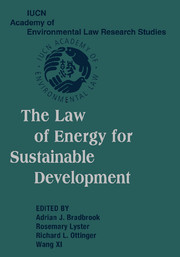Book contents
- Frontmatter
- Contents
- Acknowledgments
- Message from Kofi A. Annan, Secretary-General, United Nations
- Introduction – A Global Learned Society to Address Earth's Evolution: The IUCN Academy of Environmental Law
- Public Lectures on International Environmental Law
- PART ONE SUSTAINABLE DEVELOPMENT AND THE ROLE OF ENERGY LAW
- PART TWO LEGAL ISSUES IN CONTEMPORARY ENERGY LAW
- PART THREE INTERNATIONAL ENERGY LAW
- PART FOUR COMPARATIVE ENERGY LAW
- PART FIVE ELECTRICITY RESTRUCTURING
- PART SIX FINANCING FOR SUSTAINABLE ENERGY
- PART SEVEN CIVIL SOCIETY AND THE PROCEDURAL REQUIREMENTS OF ENERGY LAW FOR SUSTAINABLE DEVELOPMENT
- 30 The Role of Civil Society
- 31 Foundations in University Education
- 32 The Role of the Judiciary
- 33 Access to Justice and Citizen Enforcement
- 34 The Business Case and Approach to Sustainable Energy
- Index
33 - Access to Justice and Citizen Enforcement
Published online by Cambridge University Press: 10 August 2009
- Frontmatter
- Contents
- Acknowledgments
- Message from Kofi A. Annan, Secretary-General, United Nations
- Introduction – A Global Learned Society to Address Earth's Evolution: The IUCN Academy of Environmental Law
- Public Lectures on International Environmental Law
- PART ONE SUSTAINABLE DEVELOPMENT AND THE ROLE OF ENERGY LAW
- PART TWO LEGAL ISSUES IN CONTEMPORARY ENERGY LAW
- PART THREE INTERNATIONAL ENERGY LAW
- PART FOUR COMPARATIVE ENERGY LAW
- PART FIVE ELECTRICITY RESTRUCTURING
- PART SIX FINANCING FOR SUSTAINABLE ENERGY
- PART SEVEN CIVIL SOCIETY AND THE PROCEDURAL REQUIREMENTS OF ENERGY LAW FOR SUSTAINABLE DEVELOPMENT
- 30 The Role of Civil Society
- 31 Foundations in University Education
- 32 The Role of the Judiciary
- 33 Access to Justice and Citizen Enforcement
- 34 The Business Case and Approach to Sustainable Energy
- Index
Summary
William Shakespeare famously put in the mouth of Henry VI this prescription: “The first thing we do is kill all the lawyers.” Thinking about this recently led me to two questions: First, why kill all the lawyers? Second, how many would that be and how long would that take? Third, what is the problem to be addressed? Is there another solution?
In the field of environmental law, these questions are worth asking. Is the environment better off with or without environmental lawyers? How many environmental lawyers exist and what do they do? If there is an imbalance, can something be done to right it?
I will venture some answers to these questions, and then look at enforcement of environmental laws by lawyers representing citizens and civil society.
HOW MANY ENVIRONMENTAL LAWYERS AND WHOM DO THEY SERVE?
While the Shakespeare quotation gives rise to laughter in most audiences, the context of the quotation reveals a more serious meaning. In his play, Shakespeare has rebel leader and megalomaniac Jack Cade fantasizing about taking over England through force and becoming its King, so that the people will “worship me their lord.” In order to set up such a tyranny, one of his followers exclaims, “The first thing we do is kill all the lawyers.” Lawyers are a bulwark that stands in the way of those who would take power in order to abuse it. Law controls not only citizens, but also government.
- Type
- Chapter
- Information
- The Law of Energy for Sustainable Development , pp. 567 - 576Publisher: Cambridge University PressPrint publication year: 2005

